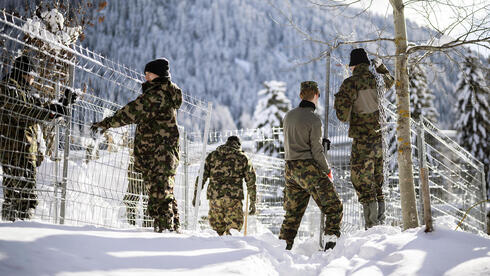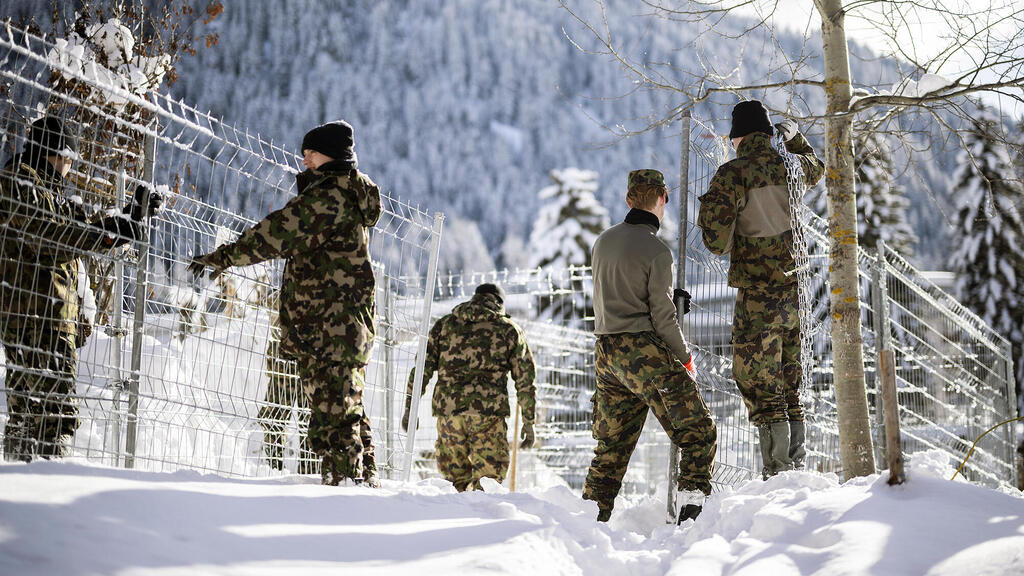
On the docket in Davos 2024: War in Gaza and AI regulation
The economic summit will open on Monday in Switzerland against the backdrop of geopolitical tensions, the Houthi threat to global trade and the desire to introduce responsible use of artificial intelligence
The World Economic Forum in Davos, Switzerland will open on Monday and continue until January 19 under the theme "Rebuilding Trust". The summit is taking place this year in the shadow of escalating geopolitical tensions - chief among them the crisis in the Middle East and the Houthi threat - and the resulting concern regarding the robustness of global trade.
The war in Ukraine, the economic slowdown and changes in the technology sector, mainly artificial intelligence, will also be discussed in the economic summit. The main concern in regards to AI in coming months is the accelerated spread of false information in a year when citizens of 40 countries are expected to go to the polls.
Zelenskyy's peace plan
The most prominent leaders expected to attend the summit are Chinese Premier Li Qiang and French President Emmanuel Macron, who will both deliver special speeches. Macron is the only leader from among the G7 countries who will participate in the economic summit, while last year it was German Chancellor Olaf Scholz. Israel will be represented by the country's president Isaac Herzog.
The President of the United States, Joe Biden, has never attended the conference in his current role, and will be absent from it this year as well. As is the case for British Prime Minister Rishi Sunak. The United States will be represented by Secretary of State Anthony Blinken, a frequent visitor to Israel these days, National Security Advisor Jake Sullivan, as well as the White House envoy for climate affairs, John Kerry. Leaders and finance ministers from a variety of countries are also expected to arrive, including Spain, Belgium, Iraq, Lebanon, Ireland, Thailand and Singapore. Sullivan is expected to participate in a meeting of national security advisers that will be held on the issue of Ukraine.
A ten-point peace plan written by Ukrainian President Volodymyr Zelenskyy is set to be presented on Sunday ahead of the summit. The plan is being widely discussed by international observers, but has not been addressed by the Russian leadership. Zelenskyy will participate in the summit via video, as is his custom at various global events since the Russian invasion of Ukraine two years ago.
On Wednesday, the incoming president of Argentina, Javier Milei, is expected to speak at the summit. He is facing widespread protests in his country against the background of the rigid economic policies he introduced, including a sharp devaluation of the Argentine currency. Milei pledged at the same time to dollarize the economy and abolish the central bank, in an attempt to rescue his country from its heavy deficit.
Among the prominent names from the business world that will arrive in Davos is Sam Altman, CEO of OpenA, the creator of ChatGPT, who is expected to discuss aspects of safety and trust in AI technology alongside other panelists, including British Finance Minister Jeremy Hunt and Pfizer CEO Albert Bourla. Microsoft CEO Satya Nadella will also participate in the conference.
According to the organizers of the conference, the theme of this year's summit, "Rebuilding Trust", was born out of the recognition of the need to restore global trust against the backdrop of complex global challenges. These include, among other things, geopolitical conflicts, climate changes that are only escalating and increasing, and as mentioned, the development of artificial intelligence, an area that is flooded with fateful questions regarding regulation. Accordingly, the program of the conference will be based on four pillars. These include discussions in the quest to create security and cooperation in a fractured world while relating to the ongoing crisis in the Middle East, creating jobs and growth towards a decade that may be characterized by weak growth, artificial intelligence as the driving force for the economy and society, as well as a long-term strategy to deal with the climate crisis.
The discussion on the climate issue will take place against the background of data published earlier this month according to which the past year was the hottest ever measured. As part of the discussion on regulation of AI, the World Economic Forum established the AI Governance Alliance which has been joined by technology giants such as Google, Microsoft, IBM and Meta in order to shape further development of the field and the policies that will ensure the responsible use of this technology.
As every year, the event will be presided over by the heads of global economic institutions, including IMF Managing Director Kristalina Georgieva and World Bank President Ajay Banga. In an interview prior to the conference with WEF founder and chairperson Klaus Schwab, Banga stated that the crises in Israel and Ukraine are undoubtedly the most worrying challenges for the near term for the world economy, this is in addition to debt crises that may afflict the developing economies.
The main issues that will be discussed at the World Economic Forum:
- Achieving security and cooperation in a fractured world: ways to create security in a fractured world, such as the ongoing crisis in the Middle East.
- Creating jobs and growth for a new era: How to spur job creation ahead of a decade that may be characterized by weak growth.
- Artificial intelligence as a driving force for the economy and society: AI technology as a driving force for the economy and society and the ways to ensure its responsible use.
- A long-term strategy for climate, nature and energy: ways to encourage investments in clean energy following the hottest year on record.















